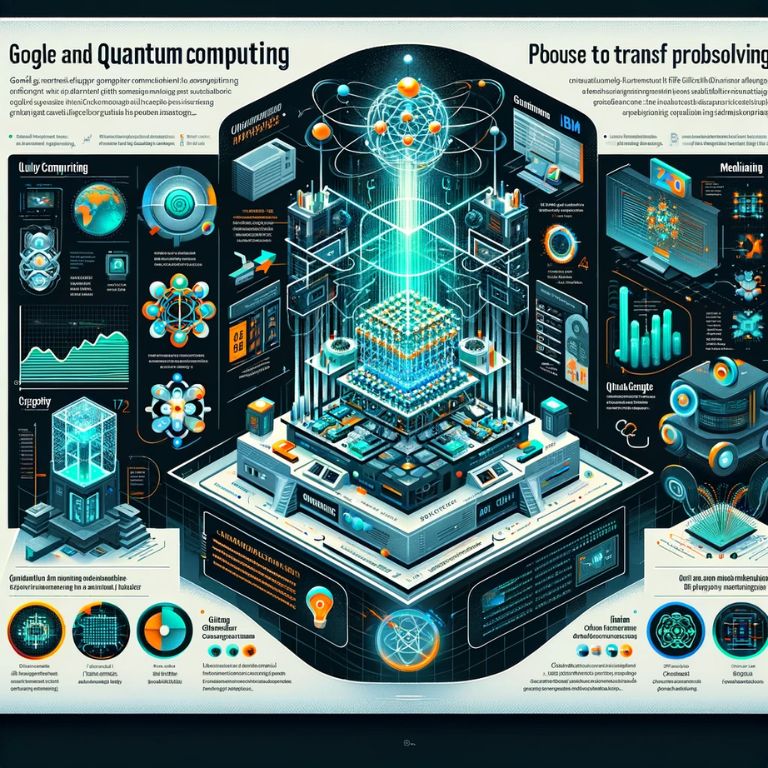Quantum computing represents a significant leap beyond traditional computing. It operates using qubits, which can exist in multiple states simultaneously through quantum mechanics principles like superposition and entanglement. This allows quantum computers to process numerous outcomes at once, offering solutions to problems currently beyond classical computing. However, challenges like high error rates and decoherence, where qubits lose their quantum state, persist. Despite these hurdles, advancements by companies like Google and IBM are moving us closer to practical quantum computing, with the potential to revolutionize problem-solving across various fields.
IBM’s Quantum Leap
IBM has recently unveiled significant advancements in quantum computing, marked by the debut of their new quantum processor, the ‘IBM Quantum Heron.’ This processor stands as the most performant in IBM’s portfolio, boasting an architecture that achieves up to a five-fold improvement in error reduction compared to its predecessor, the ‘IBM Quantum Eagle’.
Alongside this, IBM introduced the IBM Quantum System Two, a modular quantum computer that is a key element of their quantum-centric supercomputing architecture. This system, operational with three IBM Heron processors, is designed to bring quantum supercomputing closer to reality. It represents a paradigm shift in the quantum computing landscape, combining scalable cryogenic infrastructure with classical runtime servers and modular qubit control electronics.
Furthermore, IBM has expanded its Quantum Development Roadmap to extend until 2033, setting new targets to advance the quality of gate operations. This development is crucial as it aims to increase the size of quantum circuits that can be run, thereby unlocking the full potential of quantum computing at scale. The roadmap underscores IBM’s commitment to advancing quantum technology and highlights the company’s vision for the future of quantum-centric supercomputing.
In addition to hardware advancements, IBM has also made strides in quantum software with the announcement of Qiskit 1.0, the latest version of its open-source quantum programming software. Qiskit 1.0 is designed to simplify and speed up the execution of quantum circuits. Complementing this, IBM introduced Qiskit Patterns and the use of generative AI models to automate quantum code development. These innovations aim to democratize quantum computing development, allowing users to more easily create, deploy, and execute workflows integrating classical and quantum computation
Google’s Breakthroughs in Error Correction
Google has recently achieved a significant milestone in quantum computing by addressing one of its biggest challenges: error rates. The Google Quantum AI lab has developed a system that significantly decreases the error rate in quantum computations. This advancement is critical as high error rates have long been an obstacle in quantum computing, hindering the technology’s practical applications.
Error rates increase with the number of qubits, making it difficult to scale quantum computers. However, Google’s team demonstrated a practical application of an error-correcting code that can detect and fix errors without affecting the stored information. This system, first theorized in the 1990s, had previously increased errors rather than decreasing them. The successful implementation of this error-correction mechanism is a key scientific milestone, as acknowledged by Google’s researchers. It is crucial for the future of quantum computing, enabling the creation of more reliable and scalable quantum computers.
Despite this breakthrough, Google acknowledges the need for further advancements. The current error rates, though significantly reduced, are still not optimal for the practical deployment of quantum computers. The path to achieving a usable quantum computer involves more steps and continuous improvement in error rates.
This development by Google marks a major step forward in quantum computing, potentially giving the tech giant an edge over competitors. The successful reduction of error rates opens new possibilities for quantum computing, bringing the technology closer to solving complex problems that are currently beyond the reach of classical computers.
Technological Innovations and Challenges

The journey towards advanced quantum computing is marked by significant technological innovations and persistent challenges. Both Google and IBM have made notable strides in enhancing quantum computing capabilities. IBM’s Quantum System Two, with its modular architecture, and Google’s advancements in error correction, represent key developments in this field.
However, challenges like decoherence, where qubits lose their quantum state, and escalating error rates with increased qubit numbers, continue to be major hurdles. These issues are critical as they affect the stability and scalability of quantum systems. Despite these challenges, the advancements signify substantial progress, particularly in error reduction and system architecture.
To fully harness quantum computing’s potential, ongoing research focuses on overcoming these challenges while continually improving hardware and software capabilities. The goal is to develop quantum computers that can reliably solve complex problems beyond the reach of classical computers, marking a new era in technology and problem-solving.
Impact and Applications of Advanced Quantum Computing
The progress made by Google and IBM in quantum computing is set to revolutionize a range of industries and research fields. Here are some key areas where this impact is most anticipated:
- Chemistry and Material Science: Quantum computers can simulate complex molecular and chemical reactions, potentially accelerating drug discovery and material design. This capability could lead to breakthroughs in medicine and the creation of new materials with unique properties.
- Optimization Problems: In sectors like logistics, finance, and energy, quantum computing can solve complex optimization problems more efficiently than classical computers. This could optimize supply chains, financial models, and energy distribution systems.
- Quantum Supremacy: This concept refers to a quantum computer’s ability to solve problems that are impractical for classical computers. While still a goal, achieving quantum supremacy could redefine computational limits, enabling unprecedented data analysis and problem-solving capabilities.
- Cryptography and Security: Quantum computing poses both a challenge and an opportunity for cryptography. It can potentially break current encryption methods, prompting the need for quantum-resistant cryptography. At the same time, it offers new methods for secure communication through quantum encryption techniques.
- Scientific Research: In physics and cosmology, quantum computing can process vast datasets and complex simulations, potentially unlocking new insights into the fundamental nature of the universe.
- Artificial Intelligence and Machine Learning: Quantum computers can potentially process and analyze data for AI at unprecedented speeds, potentially leading to more advanced and efficient AI systems.
The potential of quantum computing is vast, but it also comes with challenges, such as error correction and qubit stability, which must be overcome to fully realize these applications. As research and development continue, the scope and impact of quantum computing are expected to expand, heralding a new era of technological advancement and problem-solving.
Looking Ahead: The Road to Quantum Supremacy
As we look towards the future of quantum computing, the path is marked by both exciting possibilities and significant challenges. The advancements by Google and IBM indicate a rapid progression towards more powerful and efficient quantum systems. The key focus areas include:
- Enhancing Qubit Stability and Coherence: Reducing error rates and increasing the stability of qubits is crucial for the practical application of quantum computers.
- Scaling Up Quantum Systems: As quantum systems grow in qubit count, managing and maintaining their performance becomes increasingly complex. Efforts are ongoing to create larger, more stable quantum systems.
- Integrating Quantum and Classical Systems: The future of computing may lie in the integration of quantum and classical systems, harnessing the strengths of both technologies.
- Quantum Software Development: As hardware advances, the development of sophisticated quantum algorithms and software becomes vital. This includes creating user-friendly programming interfaces and tools.
- Addressing Quantum Security: The potential of quantum computing to break current encryption algorithms necessitates the development of quantum-resistant cryptography.
- Exploring New Applications: As quantum technology matures, its application will likely extend into new areas, possibly revolutionizing fields like climate modeling, traffic optimization, and beyond.
The journey to quantum supremacy is a collaborative and dynamic one, requiring continuous innovation and research. The efforts of Google, IBM, and others in the field are paving the way for a future where quantum computing transforms our approach to problem-solving and data processing.
Conclusion
In conclusion, the advancements in quantum computing by industry giants like Google and IBM mark a significant leap forward in the realm of technology. These developments not only showcase the immense potential of quantum computing in solving complex problems that are currently beyond the reach of classical computers but also highlight the challenges that lie ahead. As we move closer to realizing the full potential of quantum computing, the focus remains on overcoming technical obstacles, enhancing computational capabilities, and exploring new applications across various fields.
The journey towards quantum supremacy is not just a race for technological superiority but a collaborative effort that will likely reshape the landscape of computing and problem-solving. With each breakthrough, we edge closer to a future where quantum computing becomes a pivotal tool in advancing scientific discovery, optimizing industries, and unlocking mysteries of the universe. This quantum leap promises to usher in an era of unprecedented innovation and exploration.




